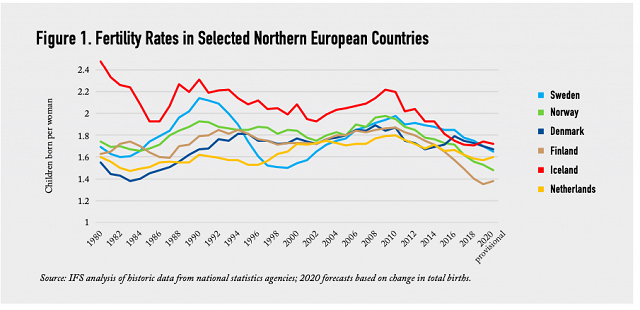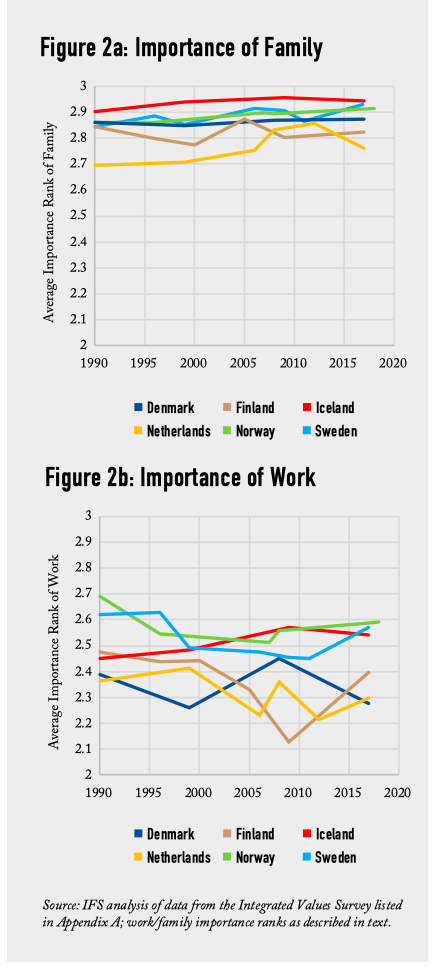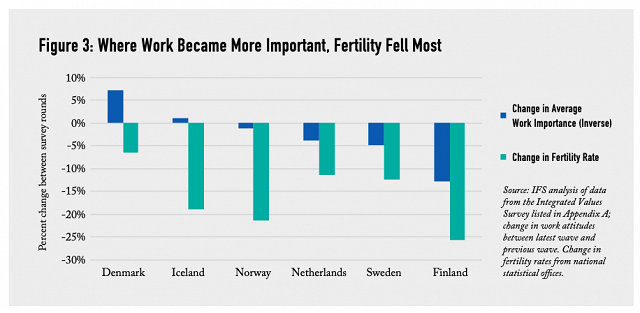
Executive Summary
In recent years, fertility rates have fallen sharply in many countries formerly believed immune to very low fertility. Egalitarian values and generous social welfare states had been credited with protecting the Nordic countries in particular from very low fertility rates, yet since 2008, birth rates in those countries have plummeted, as Figure 1 shows.

Historically, researchers have identified the “Nordic” countries1 as successful cases of relatively high fertility rates alongside highly egalitarian societies. Recent remarkable declines, then, present a crucial challenge for dominant theories of fertility change. What could possibly explain such a large, decade-long decline in fertility to historically unprecedented lows (including the lowest birth rates ever recorded in Finland, Norway, and Iceland)—even in societies that support childbearing through generous policy supports, and where gender egalitarian values have progressed further than anywhere else in the world?
In this report, we suggest that part of the answer relates to a previously under-studied social force: the changing social, moral, and even ideological place of market labor in the life course. As social values change over time, some wealthy countries with highly individualist and egalitarian values have also begun to adopt a new values-based emphasis on work and career success as a key source of meaning and value in life, which may compete with family goals.
Some theoretical background is necessary to explain both why the decline in fertility in northern European welfare states is so unexpected, and why our theory can help explain it. Developed countries have averaged less than two children per woman for over 40 years. Nonetheless, the idea that fertility rates in advanced societies could be kept at or near the replacement rate of about two children per woman is buttressed by a body of literature arguing that a return to the two-child family becomes more practical with advances in gender equity. In other words, when men “lean in” more on the home front, and both corporate and national policy become more supportive of combining work and childrearing, the lowest fertility levels will be avoided. The Nordic countries are the test cases par excellence for this theory.
There are challenges to this thesis, of course: as men “lean in” more, they face the same work-life balance issues facing women, and fertility intentions and achievement often fall. Research focusing on the durability of low fertility emphasizes individualism, family diversity, and country-specific fertility trajectories. Thus, while increasing progress towards a more gender egalitarian society might yield stable and high fertility rates, countries face other challenges.
We argue that the debate about the potential for fertility recovery can be enriched by highlighting attitudes toward work and family per se. Questions about whether families can manage to have more children by dividing the same work in ever-more-egalitarian ways, or whether individual self-actualization must forever be at odds with childbearing, both miss an important fact: families must interact with the market to achieve their goals. When work/family reconciliation is viewed through a gender equity lens, the focus is on the division of labor, with not enough attention on the value that individuals and societies directly place on work and family. Thus, our approach concurs with Ron Lesthaeghe and others, who suggest that change in value orientation may influence fertility. But whereas Lesthaeghe credits low fertility to a shift from materialist to post-materialist values, we emphasize that increasingly work-related attitudes (while putatively “materialist”) may in fact be connected to how individuals find meaning in their life. Work can be a place of socialization, friendship, public service, and status, i.e., post-materialist values.
In particular, social and values surveys measuring attitudes towards work may measure different phenomena in different countries. In lower-income countries where severe economic precarity is more common, individuals who rate work as “very important” in their life may be highly motivated by basically “materialist” concerns—work is "very important" merely for survival, let alone flourishing.
But in wealthy countries with robust social welfare states, individuals who rate work as highly important may be expressing a very different value set. In countries like Sweden or Norway, where individuals who work less are unlikely to experience food insecurity or dramatic shortfalls in life expectancy, those who place the highest subjective valuations on work may be identifying the importance of career success to their social or psychological well-being, or their accomplishment of personally motivated projects, rather than on their material well-being. Given that the total number of work hours tends to decline as countries become wealthier, which is consistent with more people using surplus income to finance leisure, people in high-income countries who continue to place a major emphasis on work are likely to be very different from people in low-income countries who report a similar emphasis. Moreover, fully egalitarian couples may express their commitment to one another by supporting each other's public sphere success and sharing the private sphere work necessary to accomplish it.
Indeed, attitudes towards work and family have changed in highly developed, highly egalitarian northern European countries. Figures 2a and 2b show the average importance rank assigned to “work” and “family” by respondents ages 18 to 55 in World and European Values Survey (WVS/EVS) questions, on a scale of zero (not at all important) to three (very important).
Between 2010 and the latest survey wave, the average importance assigned to work rose appreciably in Norway, Sweden, Finland, and the Netherlands, while falling in Denmark and Iceland. While in the long run, pro-work attitudes remain below previous record-highs, this rise in “workist” attitudes is unusual given the previously noted general decline in assessed importance of work as countries become wealthier. Assessed importance of family has been more stable and remains far higher than assessed importance of work in almost all countries and survey waves.

But do changes in work attitudes really predict changes in fertility? As a first approach to this question, we compare work attitudes in the latest WVS/EVS round to the prior round, as well as fertility in those years, as shown in Figure 3. If countries with large increases in workism, like Finland, have very different trends from countries with large decreases, like Denmark, that would suggest support for our theory connecting work attitudes to fertility.
Denmark, the only Nordic country with a decrease in work importance, also had the smallest decline in fertility over the period measured. Finland, meanwhile, had the biggest rise in work importance, along with the largest fertility decline. Trends for Iceland and Norway do not fit the pattern as well, but it is no surprise that in this simple, uncontrolled approach, the correlation between work attitudes and fertility outcomes is imperfect.

The unique experience of the Nordic countries has motivated a great deal of theorizing about fertility and family in the past, especially as they make up a large share of countries in heavily-cited sources like the OECD’s family policy database. But whether or not the dynamics observed in the unique context of the high-income, highly-egalitarian Nordic welfare states generalizes to other contexts is a crucial question.
This report broadens the scope of analysis from a few admittedly interesting northern European countries. We demonstrate that “workism” as a concept is a useful predictor of fertility in a large sample of periods and countries, and thus can improve on existing theories linking social attitudes and fertility outcomes. Therefore, we move to testing whether variation in the values ascribed to work and family tell us more about variation across low-fertility societies and the potential for fertility recovery than a narrative that treats gender inequality and gender ideology as the primary obstacles to achieving common fertility goals.
If the value placed on family—which we refer to as familism—supports procreation, more familistic people could desire to have more children, be more persistent when facing obstacles to having more children, or both. Societies where familistic values are more common would share these fertility advantages. In contrast, placing a high degree of value on work can dampen fertility desires and make them less likely to be realized: workist individuals would be expected to have fewer children, and societies where workism is common would have low fertility reinforced by prevailing norms.





